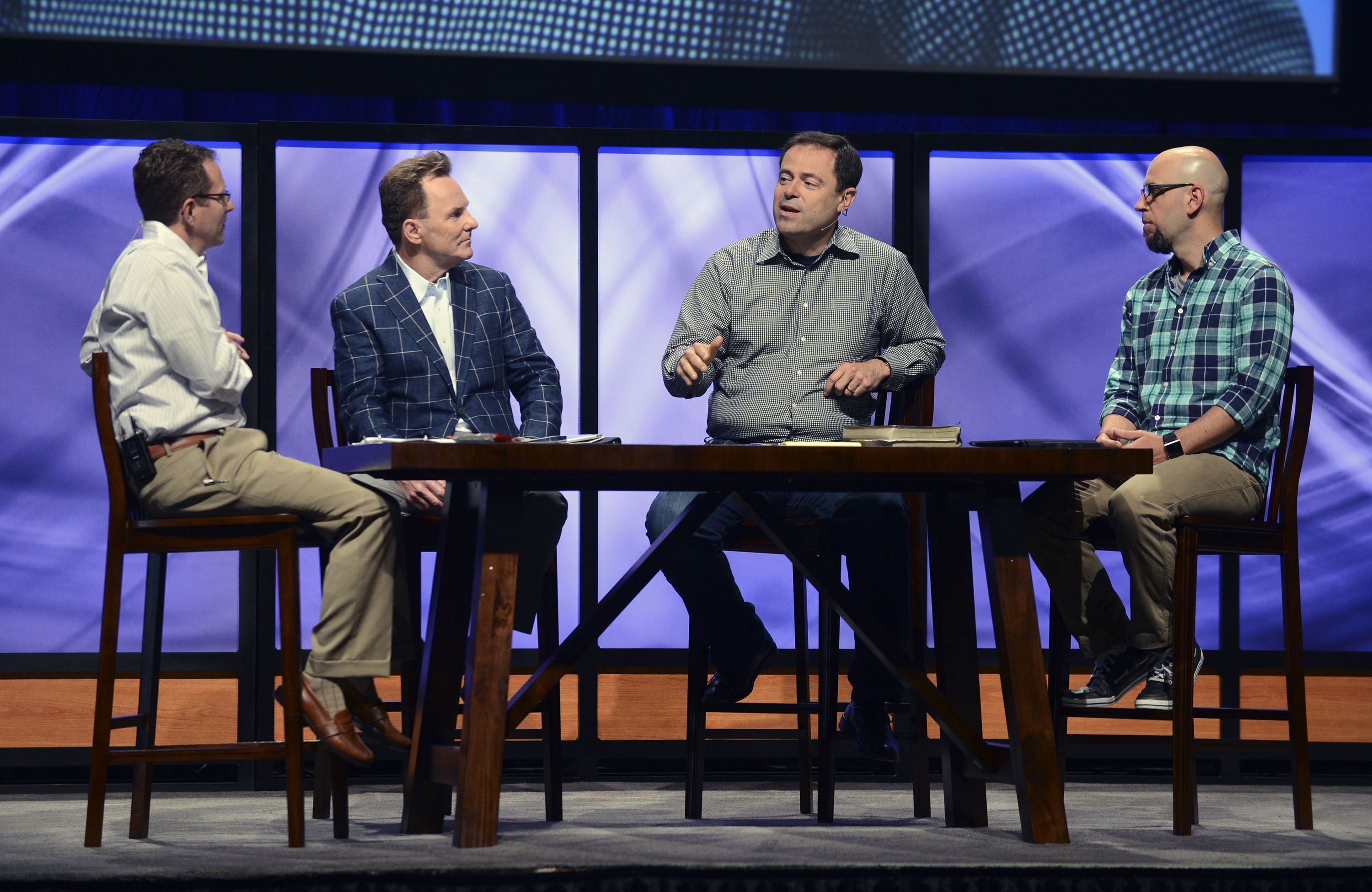
HOUSTON (BP) — Leadership and preaching — two key facets of ministry — garnered added attention at the Southern Baptist Pastors’ Conference via panel discussions during this year’s gathering in Houston.
Leadership
“Leadership is embedded in the very definition of being a pastor,” said Eric Geiger, vice president of LifeWay Christian Resources’ church resource division, in a session moderated by Pastors’ Conference President Gregg Matte, pastor of First Baptist Church in Houston and joined by Jack Graham, pastor of the Dallas-area Prestonwood Baptist Church in Plano, and Rodney Woo, senior pastor of the International Baptist Church in Singapore.
Geiger said pastors who delegate leadership or fail to develop it do so at considerable risk. Effective shepherding and good leadership go together, he said, while also noting that God will hold pastors accountable for the well-being of their flock.
Shepherding is not without the conflict and criticism that come with the role of leadership, and Geiger advised to keep it in perspective since the pastor serves the entire congregation, not just the one complaining.
Woo was pastor of a declining Houston-area church and faced dissent as he worked to draw multi-ethnic neighbors into the once-Anglo congregation. When criticism arises, he said, take it in stride, consider the source, and filter the complaint through Scripture and godly lay leaders.
But never discount it, Woo said, noting, “When the critics speak, listen.”
Woo said the most effective advice offered during the transition to a revived and ethnically diverse church came from a critic. The man — a friend born and raised in East Texas, an area still struggling with racism — suggested that Woo take the transition slowly. Doing so would help the church’s remaining Anglo members acclimate to the changes taking place instead of prompting an exodus from a congregation they no longer identified with or recognized.
Matte asked the pastors what spiritual disciplines best served them in their leadership roles. Woo said he was prompted by an otherwise boring seminary pastor to devote more time to reading Scripture. Since then he has committed to reading through the New Testament once a month.
Graham said humility of character is essential, while attitudes of entitlement or entanglements in worldly affairs “make us unattractive as leaders.”
“You can’t be a pastor without leadership,” Graham said.
Preaching
Matte noted how when a church member talks of having a great pastor, he or she often has the pastor’s preaching in mind.
“We prepare our messages, then we give our messages, then we have to recover from our messages,” said Matte, who was joined in the panel discussion by Tony Merida, lead pastor of Imago Dei Church in Raleigh, N.C., and associate professor of preaching at Southeastern Baptist Theological Seminary; Mark Dever, senior pastor of Capitol Hill Baptist Church in Washington, D.C., and president of 9Marks Ministries; and Ronnie Floyd, senior pastor of Cross Church in Springdale, Ark.
Matte asked the panelists how they prepare their messages.
“I generally plan a few weeks ahead, just knowing where I’m going with the big idea,” Merida said. “By Monday [prior to the sermon], I try to start with unanswered questions I have about the text. I try to work through the passage, identify a theme. By Monday or Tuesday, I know the big idea of the sermon.”
Merida said he writes a manuscript on Wednesday and Thursday, with editing on Friday and meditation on Saturday.
Dever said he condenses the process for composing a specific sermon into two days.
“The first day is exegesis,” Dever said. “I want to have a sermon outline by the end of the first day. Second day, I’m writing it.”
Dever added that on Saturday night before preaching on Sunday, a small group meets at his house. He reads his sermon manuscript to them, receives feedback and makes changes accordingly.
Floyd emphasized reading and meditating on the sermon texts throughout the days leading up to preaching it, while also having a concise system of sermon preparation. He said the first day he focuses on exegesis. The second day, he works to compose the sermon.
“My goal is by Wednesday it’s done,” Floyd said.
As a follow up, Matte asked each pastor if he writes and preaches from a manuscript or just an outline.
“I prepare a manuscript,” Merida said. “It helps me be precise with word choice.”
Floyd and Dever also compose manuscripts, but Dever said preaching from a manuscript isn’t for everyone.
“I use a manuscript myself, but so many young guys who use a manuscript that I see … it’s just too wooden,” Dever said, cautioning later, “Manuscripts have a lot of advantages, but none of them matter if it’s just deadly in the pulpit.”
Panelists also discussed the use of illustrations, specifically whether to use personal illustrations.
Dever said he does not favor personal illustrations, especially from the senior pastor.
“The temptation for me is to make the church kind of the ‘Mark Show,’ like ‘Come get interested in my life,'” Dever said. “I think it’s too easy to build a church carnally around a person.”
Merida concurred, saying he thinks less about illustration and more about application.
“I’m real cautious about illustrations, because I really want the text to win,” Floyd said.
Matte said he likes illustrations, calling them modern-day parables, but he underscored the importance of not telling stories just for the sake of a laugh.
Panelists also discussed the distinction between decisional preaching and public invitations. Matte said his church services still include a time for public “come forward” invitations. Floyd said his church does also, but he said bringing people to a point of decision is what’s ultimately important.
“I believe that all preaching, in my humble opinion, should lead to a decision,” Floyd said. “Now I’m not saying it needs to lead to a decision down an aisle. I don’t think that’s the real point we want to stress today, even though I value the public invitation.”
Floyd said at his church he gives four different “calls,” a Gospel call, a church membership call, a ministry and missions call, and a general call to respond to God.
Dever said he makes a point to address non-Christians directly, calling them to repent of their sins and put their trust in Christ.
“We never preach without an invitation in that sense, but I wouldn’t associate it with a physical movement at the end of the service,” Dever said.
Matte asked Merida directly what mistakes he sees preachers making. Merida said he’s concerned with preachers who favor topical preaching over expositional preaching. Too often, preachers use a text as a “diving board” rather than “swimming around it,” Merida said.
“I really think it reveals a lack of trust in the Bible,” Merida said.
Merida also called preachers to be Christ-centered in their exposition.
“When I was in seminary, we heard a lot about preaching for life change,” he said. “I just tell our guys, ‘If you want to preach life-changing sermons, then make sure the Life Changer is at the heart of every sermon.'”
Matte also asked the panelists on their average sermon length. Dever said he preaches about an hour. Floyd said 37 to 40 minutes. Merida responded 46 minutes, and Matte said he preaches about 35 minutes.
“There is nothing in the Bible about longer sermons being holier,” Dever added. “I think you can preach great long sermons and great short sermons. You can preach lousy long sermons and lousy short sermons.”
“I’ve preached both,” Floyd said.
Regarding their recovery after preaching, Matte, Floyd, Dever and Merida each shared what their Sunday afternoons and Mondays are like. Matte and Dever said they take part or all of Monday off, while Floyd said he is at the office first thing Monday. Merida said he intends to start taking a break on Mondays this year. All of them, though, emphasized guarding carefully their focused, personal time with their family.
“I made a decision over 28 years ago that every Friday I was going to take off and spend with Jeana. Every Friday, I’ve done that for 28 years, with only a few exceptions,” Floyd said of his time with his wife. “Pastors have to guard their time and their schedule.”
Floyd said both his marriage and his ministry are stronger because of that unwavering time commitment to his family.
A third panel discussion at the Pastors’ Conference addressed family and ministry with Matte and his wife Kelly; Bryant Wright, senior pastor of Johnson Ferry Baptist Church in Marietta, Ga., and his wife, Anne; and Paul Jimenez, senior pastor of First Baptist Church in Taylors, S.C., and his wife, Cheri (see separate Baptist Press June 10 article).
–30–
Frank Michael McCormick is assistant director of public relations at New Orleans Baptist Theological Seminary. Bonnie Pritchett is a correspondent for the Southern Baptist TEXAN, newsjournal of the Southern Baptists of Texas Convention.














